you may have trouble playing videos. If so, this page is also available directly on Moodle ;Direct link to that found by clicking here
Extra credit assignments were "hidden" on last week's post:
-
-Who brought two random items to make a parable of?
-Who found my address?
-------
Great discussion on the "Kingdom" count on your TV shows. Interesting that Peter Popoff won...by a landslide:
>>>>>
Which of these two churches do you like the best and why?
Is one more bounded and one more centered?
Pastor Jim of Immanuel Baptist Church of Skiatook ?:
Pastor Craig and XXX Church and Strip Church?
Hmmm that was interesting!
Here's more on the first one:
.Yes, this is real-- complete sermon here on the church's website. (and if you watch from 59 min, you'll see the context) -
---
Our main text needing con-text and Three World skills is Matthew 16, where "church" is mentioned.
To preview, we watched two more chirches. How do you like these?
NOW...
Watch
this
click "this"...or paste:
mms://streaming.fresno.edu/wainscott/on_the_death_and_resurrection_of_the_messiah_ep_3.wmv
Call FPU Center for Online Learning if doesn;t work
to see the
Ray Vander Laan video on "Caesarea Phillipi:Gates of Hell" we watched in class. (You'll need to be logged into Moodle)
Read this:
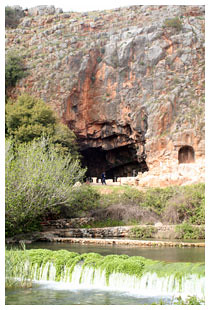 By Lyons A number of people have recently asked me – directly and indirectly – why context is important in studying scripture. Or to be more accurate, why the original Hebrew context is important. In Rabbinic fashion (how appropriately), I would like to answer this question in the form of a story. One that many Christian readers will be familiar, yet unfamiliar, with. It begins like this:
By Lyons A number of people have recently asked me – directly and indirectly – why context is important in studying scripture. Or to be more accurate, why the original Hebrew context is important. In Rabbinic fashion (how appropriately), I would like to answer this question in the form of a story. One that many Christian readers will be familiar, yet unfamiliar, with. It begins like this:Jesus and his disciples went on to the villages around Caesarea Philippi. (Mark 8:27)
For the casual reader with no geographical context, this sounds no different than “Jesus took the disciples down the road to the neighoboring village”. However, having just come from Bethsaida, this means that Jesus decided to take his disciples on a 32+ mile round trip to Caesarea Philippi, the only recorded trip Jesus took to that region or anywhere remotely like it.
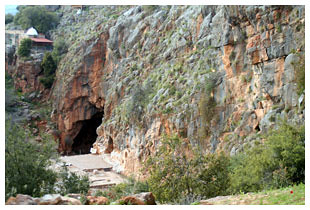 Caesarea Philippi, the modern day reserve of Banias in the Golan Heights region of Israel, was established by Ptolemaic Greeks as a hellenistic city, where the worship of the god Pan was centered. By the early first century, Caesarea Philippi (named in 2 AD by Herod Philip in honor of Caesar Augustus) was reviled by orthodox rabbis, and it was taught that no good Jew would ever visit there.
Caesarea Philippi, the modern day reserve of Banias in the Golan Heights region of Israel, was established by Ptolemaic Greeks as a hellenistic city, where the worship of the god Pan was centered. By the early first century, Caesarea Philippi (named in 2 AD by Herod Philip in honor of Caesar Augustus) was reviled by orthodox rabbis, and it was taught that no good Jew would ever visit there.
This city, which sits at the foot of Mount Hermon, butts up against a large cliff, referred to as the ‘Rock of the Gods’, in reference to the many shrines built against it. Shrines to Caesar, Pan and another god (possibly the fertility goddess Nemesis) were all built up against this cliff. In the center of the Rock of the Gods is a huge cave, from which a stream flowed (after 19th century earthquakes, the stream began flowing out from the rock beneath the mouth of the cave). This cave was called the “Gates of Hades”, because it was believed that Baal would enter and leave the underworld through places where water came out of it.
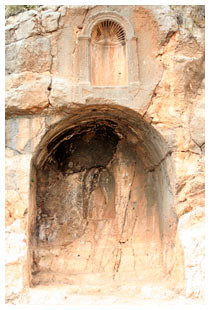 In first century Israel, Caesarea Philippi would be an equivalent of Las Vegas – Sin City – but much worse than the modern city in the American West. In the open-air Pan Shrine, next to the cave mouth, there was a large niche, in which a statue of Pan (a half-goat, half-human creature) stood, with a large erect phallus, worshipped for its fertility properties. Surrounding him in the wall were many smaller niches, in which were statues of his attending nymphs. On the shrine in front of these niches, worshippers of Pan would congregate and partake in bizarre sexual rites, including copulation with goats – worshipped for their relationship to Pan.
In first century Israel, Caesarea Philippi would be an equivalent of Las Vegas – Sin City – but much worse than the modern city in the American West. In the open-air Pan Shrine, next to the cave mouth, there was a large niche, in which a statue of Pan (a half-goat, half-human creature) stood, with a large erect phallus, worshipped for its fertility properties. Surrounding him in the wall were many smaller niches, in which were statues of his attending nymphs. On the shrine in front of these niches, worshippers of Pan would congregate and partake in bizarre sexual rites, including copulation with goats – worshipped for their relationship to Pan.
And so, one day, Jesus took his twelve disciples, most likely all of whom were in their teens or early twenties (but that’s a story for a different day), and said “we’re going to Caesarea Philippi” (if he even told them where they were going).
he asked his disciples, “Who do people say the Son of Man is?”They replied, “Some say John the Baptist; others say Elijah; and still others, Jeremiah or one of the prophets.”“But what about you?” he asked. “Who do you say I am?”Simon Peter answered, “You are the Christ, the Son of the living God.” (Matthew 16:13-16)
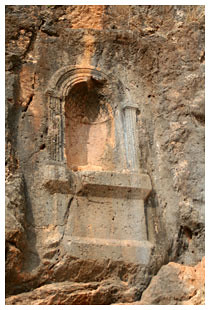 Now, we don’t know for sure where they were standing in the Caesarea Philippi region, but Jesus’ next statement gives us an idea that they may have been standing within sight of the Rock of the Gods.
Now, we don’t know for sure where they were standing in the Caesarea Philippi region, but Jesus’ next statement gives us an idea that they may have been standing within sight of the Rock of the Gods.Jesus replied, “Blessed are you, Simon son of Jonah, for this was not revealed to you by man, but by my Father in heaven. And I tell you that you are Peter, and on this rock I will build my church, and the gates of Hades will not overcome it. (Matthew 16:17-18)
Jesus continues his short lesson, ‘calling’ (the greek literally meaning shouting at the top of his voice) to the crowd and his disciples.
Then he called the crowd to him along with his disciples and said: “If anyone would come after me, he must deny himself and take up his cross and follow me. For whoever wants to save his life will lose it, but whoever loses his life for me and for the gospel will save it. What good is it for a man to gain the whole world, yet forfeit his soul? Or what can a man give in exchange for his soul? If anyone is ashamed of me and my words in this adulterous and sinful generation, the Son of Man will be ashamed of him when he comes in his Father’s glory with the holy angels.” (Mark 8:34-38)
This begs a few questions: What crowd did He call to him? Could it have been the Pan worshippers? Any crowd from this region would NOT have been religiously Jewish. Was the last statement aimed at his disciples, who might have been embarrassed at the spectacle Jesus was creating?
So What?
The Catholic tradition has taken Jesus’ pronouncement in Matther 16:18 to mean that Jesus was declaring that the church was to be built on the authority of Peter and the other disciples. It is true that they led the early church, so this would be a possible interpretation.
The Protestant tradition has taken Jesus declaration here to say that His church was to be built upon the confession recognizing Him as the Messiah and the Son of the living God. This is a valid interpretation, as well, and is a practice supported by other scriptures.
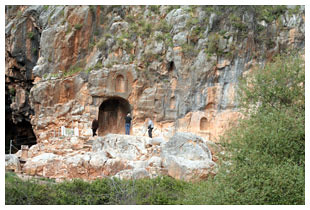 Ray VanderLaan and other Hebrew contextual scholars suggest a third interpretation which may be just as – if not more – powerful as the others, based on the context. Why would Jesus choose this place, the filthiest (morally) place within walking distance of his earthly region of ministry?
Ray VanderLaan and other Hebrew contextual scholars suggest a third interpretation which may be just as – if not more – powerful as the others, based on the context. Why would Jesus choose this place, the filthiest (morally) place within walking distance of his earthly region of ministry?
Might it be possible that he took histalmidim to the most degenerate place possible to say to them “THIS is where I want you to build my church. I want you to go out into the repugnantly degenerate places, where God is not even known. I want you to go out to places that make Caesarea Philippi look tame, and THAT is where I want you to build my church.” Because that is exactlywhat they did. They went to places in Asia Minor and the ends of the earth, where “gods” were worshipped in unspeakably awful manners and where Christians would be persecuted in horrific manner, and they gave their lives doing EXACTLY what they were told to do by their Rabbi.
I don’t know about you, but when I hear the story of Caesarea Philippi and understand it in its context, it comes to life in ways it never had before.

------------------------------
Metallica did LAMENT...remember that term...
Here is the new Fuller Studio film of Eugene and Bono on Psalms.
Links and quotes below
We watched 9:00 min mark through 19:35 mark in class
Gotta love so much about this film..like Eugene calling Rolling Stone Magazine "Rolling Stones"..
and a mosh pit a "mash pit." (;
If you like the hilarious story (excerpted above) about how EP first turned Bono down, there's a whole video of EP on that and more here.
--
EP:
"At twelve years old , [the psalms] showed me that imagination was a way to get inside the truth.
....translating a psalm...To try to get them to realize that praying wasn't being nice before God.. The psalms are not pretty; they're not nice...just pray this psalm.. It's not smooth; it's not nice, it's not pretty; but it's honest. And I think we're trying for honesty..which is very, very hard in our culture.
We need to find a way to cuss...without cussing. And the imprecatory psalms surely do that.
We've got to some way in context; and the context is the whole Bible; whole psalter...to tell people how mad we are.
...We have crosses in every room in this house. But when I look at those, I don't think of decoration; I think 'This is the world we live in..and it's a world with a lot of crosses . ' And I would just like to spend my life in doing something about that through Scripture, through preaching, through friendship. My years are getting shorter, and I don't have many left; but I don't want to escape the violence..."
Bono:
"The only way we can approach God..if we're honest..is through metaphor; through symbol. So art becomes essential; not decorative.
..The psalmist is brutally honest about the explosive joy that he's feeling and the deep sorrow or confusion, and it's that that sets the psalms apart for me.And I often think,
'Why isn't church music more like that'? ..
...I'm talking about dishonesty. I find in a lot of Christian art ..a lot of dishonesty. I think it's a shame because these people are vulnerable to God (in a good way)...porous; open.. I would love if this conversation would inspire people who are writing these beautiful.., gospel songs: write a song about their bad marriage; write a song about how they're pissed off at the government. Because that's what God wants from you: the truth... The truth will set you free; it will blow things apart. Why I'm suspicious of Christians is because of this lack of realism..and I'd love to see more of that in art and life and music."
(answering "What is the work of the artist..in acknowledging the intensity; the reality of the feeling without indulging the feeling?").
Having feelings is perfectly normal. ...David danced naked in front of the troops; that's one reason I like him .. abandonment... very important... understanding our bodies as well as our minds and ourspirits. The Three-Personed God --The Trinity--is reflected in our body, mind and spirit..,We really do ignore this.
--
--------------------------
See:
---------------------------------
Kraybill calls Jesus IRREVERENT
The pastor whose church who histed the concert called Jesus SCANDALOUS
Peterson says his parables are a LOUD FART in the salon....
Jesus (almost) uses the B-word??
But he saves that term for Herod...a religious leader...HMmm..
see this and this
and this
( Bonus:"St Paul (sorta) uses the S-word??
See this)
Remember "brood of vipers?"
Subtle(:
Who are the only types Jesus seems to be angry at? Who does he lament and vent about??
====
"Worship"??
Not long ago, our church had some documents to fill out for the IRS (Why in the world is church connecting with IRS?.. But that's another post and topic for another day). So I said to one of our leadership team, "can we have you sign a form after worship?"
Later, as we were signing, she said "I wondered wbat happened. You said we should sign after worship, so when we didn't sign after worship, I figured you forgot."
I had ansolutely no idea what she meant.
Then it hit me. In many circles (and in her previous chiurch, the songs that are sung early in the gatherings are called "worship" or the "worship time" or "worship songs." So she thought i meant "after the music," and I meant "after the gathering (Of course, my definition was ecen more problematic)..
It is unbelievable that so few ever even notice, let alone challenge, this common practice in contemporary church. As I blogged a few years ago:
So I was thrilled to catch Dan Kimball's post below (the "worship=music" reference is so accepted and entrenched that in spite of this post below, Kimball has another post called new worship music "Radiant")
I would love to get this topic on the table. It's not just semantics. Well, actually it IS..but semantics matters.
Kimball:
I Love what St. Mark Thomas posted on my original post:
---
Church visit.
Here's the scoop on church Dave pastors..you have been warned: (:
Third Day Fresno:
Sunday 10:10 am, meets at New Creation Ministries building, NW corner of St James Anglican Cathedral (behind it). Officially,, the building is at 3890 N. Tenth and Saginaw. The St James church itself is Cedar and Dakota. You can park on the street on Tenth or Saginaw, or in the church lot, in the part
near Zoe Eden Hall and the Thrift store
--
"I will give you the keys of the kingdom of heaven; whatever you bind on earth will be[d] bound in heaven, and whatever you loose on earth will be[e] loosed in heaven."
Metallica did LAMENT...remember that term...
Here is the new Fuller Studio film of Eugene and Bono on Psalms.
Links and quotes below
We watched 9:00 min mark through 19:35 mark in class
Gotta love so much about this film..like Eugene calling Rolling Stone Magazine "Rolling Stones"..
and a mosh pit a "mash pit." (;
If you like the hilarious story (excerpted above) about how EP first turned Bono down, there's a whole video of EP on that and more here.
--
EP:
"At twelve years old , [the psalms] showed me that imagination was a way to get inside the truth.
....translating a psalm...To try to get them to realize that praying wasn't being nice before God.. The psalms are not pretty; they're not nice...just pray this psalm.. It's not smooth; it's not nice, it's not pretty; but it's honest. And I think we're trying for honesty..which is very, very hard in our culture.
We need to find a way to cuss...without cussing. And the imprecatory psalms surely do that.
We've got to some way in context; and the context is the whole Bible; whole psalter...to tell people how mad we are.
...We have crosses in every room in this house. But when I look at those, I don't think of decoration; I think 'This is the world we live in..and it's a world with a lot of crosses . ' And I would just like to spend my life in doing something about that through Scripture, through preaching, through friendship. My years are getting shorter, and I don't have many left; but I don't want to escape the violence..."
Bono:
"The only way we can approach God..if we're honest..is through metaphor; through symbol. So art becomes essential; not decorative.
..The psalmist is brutally honest about the explosive joy that he's feeling and the deep sorrow or confusion, and it's that that sets the psalms apart for me.And I often think,
'Why isn't church music more like that'? ..
...I'm talking about dishonesty. I find in a lot of Christian art ..a lot of dishonesty. I think it's a shame because these people are vulnerable to God (in a good way)...porous; open.. I would love if this conversation would inspire people who are writing these beautiful.., gospel songs: write a song about their bad marriage; write a song about how they're pissed off at the government. Because that's what God wants from you: the truth... The truth will set you free; it will blow things apart. Why I'm suspicious of Christians is because of this lack of realism..and I'd love to see more of that in art and life and music."
(answering "What is the work of the artist..in acknowledging the intensity; the reality of the feeling without indulging the feeling?").
Having feelings is perfectly normal. ...David danced naked in front of the troops; that's one reason I like him .. abandonment... very important... understanding our bodies as well as our minds and ourspirits. The Three-Personed God --The Trinity--is reflected in our body, mind and spirit..,We really do ignore this.
--
--------------------------
See:
---------------------------------
Kraybill calls Jesus IRREVERENT
The pastor whose church who histed the concert called Jesus SCANDALOUS
Peterson says his parables are a LOUD FART in the salon....
Jesus (almost) uses the B-word??
But he saves that term for Herod...a religious leader...HMmm..
see this and this
and this
( Bonus:"St Paul (sorta) uses the S-word??
See this)
Remember "brood of vipers?"
Subtle(:
Who are the only types Jesus seems to be angry at? Who does he lament and vent about??
====
"Worship"??
worship = singing?
 |
| image borrowed from the post, "Cavinism as 'The Big Tent?'" |
Later, as we were signing, she said "I wondered wbat happened. You said we should sign after worship, so when we didn't sign after worship, I figured you forgot."
I had ansolutely no idea what she meant.
Then it hit me. In many circles (and in her previous chiurch, the songs that are sung early in the gatherings are called "worship" or the "worship time" or "worship songs." So she thought i meant "after the music," and I meant "after the gathering (Of course, my definition was ecen more problematic)..
It is unbelievable that so few ever even notice, let alone challenge, this common practice in contemporary church. As I blogged a few years ago:
A strange shift began about fifteen years ago,
Ask most evangelical or charismatic Christians in USAmerica about the place of "worship"
in a gathering. For some strange reason, the word has come to be synonymous with "the songs sung early in the meeting."
"Good morning! After the worship, the children will be dismissed, and Pastor Steve will share from God's word"
We even call the person leading the singing the "worship leader."
Whazzup with that?
Of course, this definition is foreign to Scripture, and to the church in all history and places..until our lifetime in the ... continued
So I was thrilled to catch Dan Kimball's post below (the "worship=music" reference is so accepted and entrenched that in spite of this post below, Kimball has another post called new worship music "Radiant")
I would love to get this topic on the table. It's not just semantics. Well, actually it IS..but semantics matters.
Kimball:
Should the church accountant be the one called the "worship pastor"?
The title of this blog post and question that I ask is not one I am totally serious about - and not really suggesting we actually do call the accountant the worship pastor. But I do have the question of how we have overwhelmingly defined "worship" to primarily be music and singing.
I have become very aware of the power of words—and the power of defining words. In the Christian culture we have created I don't believe we can ever assume anymore when we say the terms "gospel", "Jesus", "salvation", "inspired", "evangelical", "evangelism", "missional" etc. we all mean the same thing. I have learned (and sometimes the hard way) that you need to be asking definitions of terms with specific meaning to understand how someone else uses a term that may differ from your definition.
One of these terms is "worship".
If you were to ask most teenagers and young adults what comes to their minds when they hear the word "worship" it will likely be singing. I understand why they do, as we have pretty much defined worship to them over the past 20 years or more as worship = singing. Now it is totally true that we worship as we sing. But that is only one aspect of worship. We have subtly taught (in my opinion) a reductionist view of worship limiting it primarily to music and singing as what defines the word and practice.
I try to pay attention to reasons why we define worship mainly as music these days. And it is not too difficult to discover. What do we call the person in a church who leads the band or singing? It is normally the "worship pastor" or "worship leader". When our music leaders say, "Let's now worship," that is when the singing begins. When a sermon begins or when the offering is received we often don't say ""Let's now worship" like we do when the singing starts. When we think of Sunday gatherings of the church and when does worship happen, we generally think of the singing - not the teaching or the sacrifice of people who are worshiping by volunteering time in the children's ministry or other things happening. You look the Christian albums and as we call them "Best of Worship" or "Worship Greatest Hits" that reinforce the idea that music is the primary—or even only—form of worship. I just read on a Facebook post how a group was bringing in a guest person to "lead worship" and of course this guest person was a musician.We constantly, constantly reinforce by how we use that word casually all the time that it primarily means music and singing.
I Love what St. Mark Thomas posted on my original post:
Mark Thomas said...
- I teach a lot of younger people about worship and what it means. I usually start in the Old Testament and end somewhere in Revelation (chapter 4 or 5) are great examples of crazy and wild "throne room" worship. One thing that I always stress is that worship is not exclusively music. That worship can happen anywhere and not just the first 20-40 minutes of a Sunday/Saturday/Wednesday church service. In fact, there is no such thing as a "worship song"! A song is simply a song, a tool. One must be in the attitude and in the Spirit for the song to be even used in worship. Otherwise it's nothing different than what we might hear on our top 40 radio stations on any given Monday/Tuesday/Thursday/Friday. Does anyone still listen to FM radio? Worship (and revelation) happens when we're in a place of incomprehension, bedazzlement, and transformation. It has to. What do you expect after meeting God face to face and giving Him all the glory? -Mark Thomas
Church visit.
Here's the scoop on church Dave pastors..you have been warned: (:
Third Day Fresno:
Sunday 10:10 am, meets at New Creation Ministries building, NW corner of St James Anglican Cathedral (behind it). Officially,, the building is at 3890 N. Tenth and Saginaw. The St James church itself is Cedar and Dakota. You can park on the street on Tenth or Saginaw, or in the church lot, in the part
near Zoe Eden Hall and the Thrift store
--
Remember: skip the NT Churches Worksheet
Extra credit..shh!: In the Matthew 16 text we studied, and watched films on,
it mentions in verse 19:
"I will give you the keys of the kingdom of heaven; whatever you bind on earth will be[d] bound in heaven, and whatever you loose on earth will be[e] loosed in heaven."
For extra credit, answer the question below , and post your answer in the comments section below this post (If you don't have one of the accounts listed, just sign in as "anonymous." But be sure to include your name in your answer, so you can get credit) You don't have to have the "right" answer, but do give one.
Question: Based on your knowledge, studies, or a quick googling, What did Jesus mean by "bind and loose"?
What is "binding and loosing" in the Bible?
Remember: skip the NT Churches Worksheet






No comments:
Post a Comment